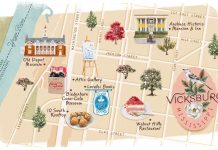
Photograph by John Trainor/Flickr
- Most towns between Atlanta and Savannah have a Sherman story, though Covington’s is less harrowing than some: His troops looted the town but otherwise left it intact.
- That well sitting smack in the middle of downtown Social Circle? It’s a replica of the town’s earliest water source (though the source of the town’s name remains unclear).
- Chartered in 1786, Greensboro can claim the dubious distinction of being the first U.S. town to be sacked and burned to the ground by Native Americans.
- In 1832 Hezekiah Rutledge purchased 132 acres of Morgan County farmland for $250; these days, a small patch of that is occupied by the town that bears his name.
- After the Georgia Railroad Company was chartered in 1833, Buckhead became a layover for trains that weren’t allowed to run on Sundays.
- Madison’s historic district is the state’s second largest (watch your back, Macon).
- The Battle of Kettle Creek, a crucial skirmish on the Revolutionary War’s southern front, was waged just twelve miles from Washington.
- From 1804 till 1868, Milledgeville served as Georgia’s fourth state capital, nestled between Louisville and some backwater called Atlanta.
This article originally appeared in our August 2013 issue.
Advertisement













